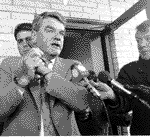Summary:
A
computerised public opinion poll in
Australia has established (June 2000) that
roughly four out of every five Australians
consider that David Irving should be
allowed to enter and tour Australia, and
that "revisionist" historians should not
be silenced. Facts:
82.46 percent of Australians think
that "some speakers" should not be
prevented from entering Australia (the
David Irving case being specifically
instanced), and on another count answering
the question, "Revisionist historians:
should they be silenced," the No vote is
82.10 percent. |
Picture
added by this website: Mr Irving being
taken, handcuffed, at Niagara Falls to
airport, Nov 13, 1992 Revisionist
historians: Should they be
silenced? This "issue" was first published on
October 05, 1999. It is currently ranked
No. 245. Its last ranking was 275. This complex
question is raised by Dennis
Stevenson in an Internet article
dated September 29th 1999. He uses the
well known case of David Irving,
who has been refused a visa to visit
Australia as an example of what he
calls the 'persecution of the holocaust
questioners'. Stevenson begins his article by making
a case for Irving's scholarly credentials,
something that many people have been
unwilling to accept. "His books are found in almost
every library in the world. Irving has
written more than thirty volumes on the
Second World War published by a half
dozen of the most prominent publishers
in the Western World, including: The
Viking Press, Harper & Row, Little,
Brown, Simon & Schuster, and Avon
Books.The most respected historians in the
world, including A.J.P. Taylor,
Trevor Roper, Gordon Craig, and
Stephen Ambrose have praised his
works. He has researched in the German
State Archives for more than thirty
years, as well as in the U.S. National
Archives, the British Public Records
Office, the government archives of
Australia, France, Italy and Canada,
and even the former Soviet Secret State
Archives. He was the first
historian to challenge the validity
of the widely heralded (and later
debunked) Hitler Diaries. In the course
of his wide ranging research, Irving
has uncovered many documents that
challenge parts of the Holocaust
orthodoxy." Stevenson  then
chronicles a number of Irving's findings
and then lists the actions taken by
various organisations and governments
against him. Towards the end of the
article Stevenson makes some points that
do have a certain resonance. then
chronicles a number of Irving's findings
and then lists the actions taken by
various organisations and governments
against him. Towards the end of the
article Stevenson makes some points that
do have a certain resonance. "In Canada, at the request of
the Simon
Wiesenthal Center, the authorities
seized, shackled, and deported him from
the country in handcuffs. The Toronto
Globe & Mail asked why he had been
handcuffed and then answered its own
question, Did someone think he might
use his typewriter?" And later, "There are those who say that
we should not debate aspects of the
Holocaust any more than we should
debate those who say the world is flat.
Yet, would any knowledgeable person be
afraid to debate an advocate of the
flat Earth theory? Would he urge the
passage of laws to prevent the advocate
of that theory from speaking, writing
or publishing? Would he try to have his
livelihood destroyed, have him fined
thousands of dollars, and if that did
not work, cast him into prison?" And to finish, "What "historical fact" is so
weak that it must be protected by
terror, by jail, and deportation? What
do the opponents of David Irving and
the other revisionists fear? Are the
revisionist arguments so convincing
that their opponents must use naked
political oppression to silence them?" By quoting selectively from Stevenson's
article for space reasons we may have
inadvertently detracted from its impact,
but the argument he is making seems clear
enough. Posters are reminded that this is
an extremely
sensitive
issue, with many families and individuals
still experiencing pain associated with
the holocaust, and Publicdebate
understands and respects that some people
feel that this topic should not even be
raised.
Related stories:
 Australia
index Australia
index Australian
newspaper
prints citizen's demand for ban on
David Irving to be lifted Australian
newspaper
prints citizen's demand for ban on
David Irving to be lifted
|